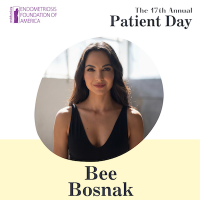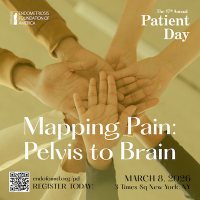
PHOTO: Original illustration by Stephanie DeAngelis
Article by: by DANIELLE DIRECTO-MESTON | MYDOMAINE
Bloating, breast tenderness, and mood swings are often part of the routine during that time of the month, so it's no surprise that many of us tend to blame any type of period pain as yet another part of womanhood. When it comes to experiencing severe cramps, however, it turns out that not all menstrual discomfort is a regular sign of a healthy reproductive system—in fact, it could be among the symptoms of endometriosis, a painful and often undiagnosed medical condition that occurs in about one of 10 menstruating women of all ages in the U.S. and can affect fertility, according to the American Society for Reproductive Medicine.
"Endometriosis is caused when the endometrium, the lining of the uterus, implants in areas outside of the womb. As the woman's hormones fluctuate, and as she menstruates, the implants have no way to exit the body in the way that the endometrium is supposed to," says Tamer Seckin, MD, FACOG, a New York–based gynecologist and co-founder of the Endometriosis Foundation of America. The disease is hard to diagnose because it's still taboo to talk openly about periods, he says, but the best way to bring awareness is to talk about it.
Lena Dunham recently recounted her own painful experience with the chronic condition on Lenny Letter. "From the first time I got my period, it didn't feel right," she writes. "The stomachaches began quickly and were more severe than the mild-irritant cramps seemed to be for the blonde women in pink-hued Midol commercials."
Surprisingly, medical school curriculums don't include endometriosis, says Seckin, and his organization is working with universities and legislators to make it a requirement to teach the topic. In the meantime, "we have to change the mindset of physicians and make them more aware of this disease [and] reach the women who have it or think they might have it, and the doctors who are treating them," he adds. "Patients are often sidetracked by the wrong diagnosis of a chronic nature, resulting in them going through unnecessary treatments and multiple surgeries. Educating both the public and the medical community leads to early diagnosis and early intervention."
Read on for four symptoms of endometriosis that you may want to look out for—and if any of them sound familiar to you, it may be time to consult your doctor for help.
You have severe cramps.
"More than half of young girls experience pain with their periods," explains Seckin. "The vast majority of my patients had exceedingly painful periods beginning with their very first one. Women should look out for 'killer cramps,' [which] are debilitating and leave you in bed curled up with a heating pad. Many young women think these cramps are normal especially if their mother suffered with them," he says. "These are not normal."
Your menstrual flow seems heavier and longer than normal.
If you use pads or tampons, it's usually recommended to change them every three to six hours to avoid toxic shock syndrome. However, if you find that you need to freshen up every hour or two during most of your cycle, that's a sign that your menstrual flow is unusually heavy. And if your period lasts longer than one week (the average is between two to seven days), then it might be time to check in with your doctor.
You experience pain during sex.
Experts agree that sex has numerous health benefits—but if getting intimate causes intense physical pain, that could be a red flag that you have endometriosis. If the affected tissue is located behind the vagina and the lower uterus, the motions of sex could push and pull on the growths, resulting in pain that can last for up to two days after sex, according to Everyday Health.
You have frequent urinary or bowel problems.
Since endometriosis occurs in the pelvic area, it can affect bladder functions and bowel movements if there are adhesions or lesions obstructing those organs. This results in side effects that include but aren't limited to a frequent urge to urinate, painful urination or bowel movements, and diarrhea, according to the Endometriosis Research Center.
When it comes to treatment, Seckin explains that laparoscopic deep-excision surgery is the most effective way to completely remove all of the inflammatory tissue. "Depending on how extensive the disease is the surgeon not only has to be trained to eliminate the disease but also needs to be skillfully prepared to reconstruct organs affected by the disease," he says. "Birth control pills, intrauterine devices, pain medications, and hormone therapy are helpful in treating symptoms of endometriosis, but they do not treat the disease."









